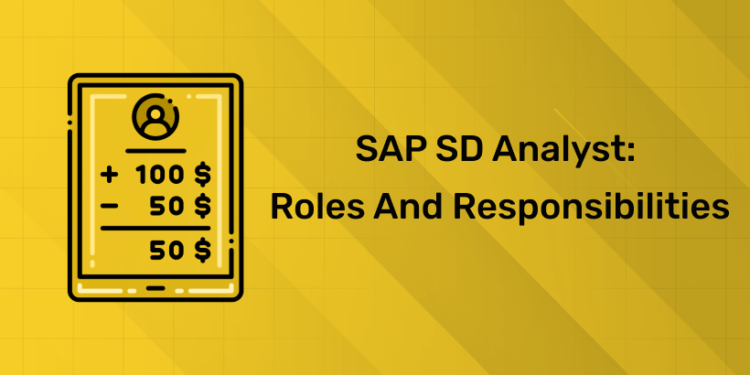Table of Contents
Introduction
Effective enterprise resource planning (ERP) systems are crucial for the smooth functioning of modern businesses. A central cog in such systems is SAP’s Sales and Distribution (SD) module. The SAP SD Analyst helps organisations to sell effectively and distribute efficiently so that they can satisfy customer demand while making the most of their resources. This blog will delve into the roles and responsibilities of an SAP SD Analyst and how they contribute to the overall success of an organisation.
Understanding the Role of an SAP SD Analyst
What is SAP?
SAP is one of the world’s most popular ERP programmes, employed by organisations around the world to manage their business processes and customer relations. It contains different modules such as finance (FI), controlling (CO), materials management (MM) and sales and distribution (SD). Each module addresses particular business processes, enabling companies to improve their efficiency.
Join to learn SAP SD from the Experts! Click for the demo class!
What is an SAP SD Analyst?
An SAP SD Analyst is a person who specializes in the SAP SD module, analysing, designing and implementing sales and distribution solutions. They liaise with salespeople, executives and IT experts to help the SAP SD module meet the company’s needs.
Master SAP with Expert-Led Courses
Unlock your potential with our comprehensive SAP courses! Learn essential modules like SAP MM (Materials Management), SAP SD (Sales and Distribution), and SAP FICO (Financial Accounting and Controlling) from industry experts.
Know MoreKey Responsibilities of an SAP SD Analyst
1. Requirement Gathering and Analysis
The SAP SD Analyst’s job entails, primarily, collecting and analysing business requirements. It means collaborating with stakeholders to determine what they require and expect from sales and distribution processes. Through interviews, workshops and surveys the analyst can pinpoint deficiencies in existing procedures and suggest improvements that will increase efficiency.
2. Configuration and Customization
After the requirements are gathered, the SAP SD Analyst customises the SAP SD module to fit the organisation’s needs. These include establishing master data, setting up sales document types and pricing procedures. The analyst makes sure that the system is configured to enable easy order processing, billing and shipping.
3. Testing and Quality Assurance
All changes must be tested thoroughly before going live. SAP SD Analysts develop test plans and scenarios to verify the configuration and customisation. They carry out unit tests, integration tests and user acceptance tests (UAT) to verify that the system behaves as expected and satisfies users’ needs.
4. User Training and Support
A key responsibility of the SAP SD Analyst is to train and support end-users. Once the new methods or procedures have been implemented, the analyst trains users in the new system. They are also the first people to contact with any questions or problems regarding the SAP SD module, enabling users to make effective use of the system.
5. Documentation
Proper documentation is essential for the integrity of the SAP SD module. The SAP SD Analyst documents configuration settings, process flows and user manuals. This documentation facilitates further improvements and eases the integration of new employees.
6. Continuous Improvement
Organisations’ needs, too, evolve alongside the business environment. The SAP SD Analyst is instrumental in spotting opportunities for improving the sales and distribution processes. They assess system performance, collect user feedback, and suggest improvements to increase efficiency and effectiveness.
Skills Required for an SAP SD Analyst
The following skills and competencies are required to succeed as an SAP SD Analyst:
1. In-depth Knowledge of SAP SD
You need an in-depth understanding of the SAP SD module. Such knowledge includes an understanding of concepts like pricing, billing, sales order processing and shipping.
2. Analytical Skills
It is important to be able to examine intricate business needs and convert them into functional requirements. SAP SD Analysts require excellent analytical abilities in order to pinpoint problems and devise solutions.
3. Communication Skills
Effective communication is essential for working with partners and educating end-users. SAP SD Analysts have to explain technical issues succinctly and clearly to non-technical people.
4. Problem-Solving Skills
SAP SD Analysts face a number of challenges. They possess excellent problem-solving skills which help them recognise problems, suggest solutions and make adjustments.
5. Project Management Skills
A significant number of SAP SD Analysts work on projects, which necessitates project management skills. To complete a project successfully, one needs to control schedules, budgets and the hopes of interested parties.
Join to learn SAP SD from the Experts! Click for the demo class!
The Importance of an SAP SD Analyst in Business
Enhancing Customer Satisfaction
A good SAP SD Analyst is instrumental in increasing customer satisfaction. They maximise sales and distribution, timely order fulfilment, correct billing and effective customer communication. This results in better customer experiences and loyalty.
Streamlining Operations
The SAP SD Analyst helps the company run more efficiently. They streamline operations by customising the SAP SD module to fit their business processes, thereby removing redundancies and bottlenecks.
Supporting Business Growth
As organisations expand, so do their sales and distribution requirements. SAP SD Analysts provide companies with the tools to accommodate these changes by creating flexible systems that can grow along with the company. Should it wish to enter new markets or add product lines, the analyst makes sure that the SAP SD module can handle such developments.
Facilitating Data-Driven Decision Making
The SAP SD module produces useful data that companies can use for making decisions. An SAP SD Analyst makes certain that this data is correct and available so that management can base its decisions on up-to-the-minute information.
Master SAP with Expert-Led Courses
Unlock your potential with our comprehensive SAP courses! Learn essential modules like SAP MM (Materials Management), SAP SD (Sales and Distribution), and SAP FICO (Financial Accounting and Controlling) from industry experts.
Know MoreChallenges Faced by SAP SD Analysts
Keeping Up with Technological Changes
The technology environment is dynamic, and SAP updates its software regularly. To make optimal use of the SAP SD module, SAP SD Analysts have to keep abreast of all new features and functions.
Managing Stakeholder Expectations
It can be difficult to balance the needs and expectations of different stakeholders. SAP SD Analysts have to manage the conflicting interests and convince everyone to pull in the same direction.
Ensuring Compliance
They have to obey laws and standards. SAP SD Analysts have to make the sales and distribution processes conform to such requirements, which can be a complicated and time-consuming task.
Join to learn SAP SD from the Experts! Click for the demo class!
Career Path for SAP SD Analysts
Educational Background
Generally, to become an SAP SD Analyst, you need a bachelor’s degree in business administration, information technology or a similar field. Some companies might also want a master’s degree or relevant certification.
Certifications
Certifications in SAP can improve one’s job prospects. SAP SD Analysts find the SAP Certified Application Associate – Sales and Distribution certification particularly useful, as it proves their proficiency in the module.
Gaining Experience
Practical experience is vital for wannabe SAP SD Analysts. A few years in an entry-level position in sales, customer service or IT can teach you a lot about sales processes and ERP systems.
Advancing in the Field
SAP SD Analysts who gain experience can become SAP SD Consultants, SAP Project Managers or executives in the company. To get ahead in this profession, one must constantly learn and attend professional development courses.
Join to learn SAP SD from the Experts! Click for the demo class!
Conclusion
SAP SD Analysts are key components in the functioning of any organisation that uses SAP for its sales and distribution. By analysing business needs, setting up the SAP SD module and ensuring follow-up support, these specialists play an important role in improving operational efficiency and customer gratification. Since companies will always need to improve their performance, qualified SAP SD Analysts will be in high demand for the foreseeable future – and it’s a fascinating field for anyone interested in the interplay between technology and commerce. Equipped with the necessary skills and experience, and a commitment to lifelong learning, aspiring SAP SD Analysts can build a rewarding career in this dynamic field, contributing to the success of their organisations.
Master SAP with Expert-Led Courses
Unlock your potential with our comprehensive SAP courses! Learn essential modules like SAP MM (Materials Management), SAP SD (Sales and Distribution), and SAP FICO (Financial Accounting and Controlling) from industry experts.
Know MoreFrequently Asked Questions
What is the primary role of an SAP SD Analyst?
The primary role of an SAP SD Analyst is to analyze, configure, and optimize the Sales and Distribution module of the SAP ERP system. They ensure that sales processes are efficient and meet business requirements, including order processing, billing, and shipping.
What qualifications are needed to become an SAP SD Analyst?
Typically, a bachelor’s degree in business administration, information technology, or a related field is required. Relevant certifications, such as the SAP Certified Application Associate in Sales and Distribution, can enhance job prospects.
What are the key skills required for an SAP SD Analyst?
Key skills include:
- In-depth knowledge of the SAP SD module
- Strong analytical and problem-solving abilities
- Excellent communication skills
- Project management skills
- Experience with data analysis and reporting
How does an SAP SD Analyst gather business requirements?
SAP SD Analysts gather business requirements through interviews, workshops, and surveys with stakeholders. They aim to understand their needs and identify gaps in current processes.
What is the significance of testing in the SAP SD Analyst's role?
Testing ensures that the configurations and customizations made in the SAP SD module meet the specified requirements. It involves unit testing, integration testing, and user acceptance testing to validate the system’s functionality before going live.
How does an SAP SD Analyst contribute to customer satisfaction?
By optimizing sales and distribution processes, SAP SD Analysts ensure timely order fulfillment, accurate billing, and effective communication with customers. This leads to improved overall customer experiences and satisfaction.
What challenges do SAP SD Analysts face in their work?
Challenges include keeping up with rapid technological changes, managing stakeholder expectations, ensuring compliance with regulations, and addressing complex business requirements.
What is the career progression for an SAP SD Analyst?
Career progression may lead to roles such as SAP SD Consultant, SAP Project Manager, or leadership positions within the organization. Continuous learning and gaining experience are crucial for advancement.
How important is documentation in the role of an SAP SD Analyst?
Documentation is vital as it provides a reference for configuration settings, process flows, and user manuals. It helps ensure consistency, supports training, and facilitates future enhancements.
What industries employ SAP SD Analysts?
SAP SD Analysts are employed across various industries, including manufacturing, retail, logistics, pharmaceuticals, and any organization that utilizes SAP for sales and distribution processes. Their expertise is applicable in any sector that deals with customer order management and delivery.










